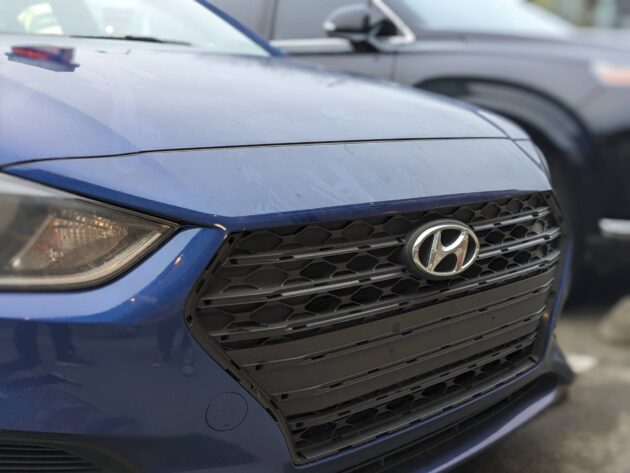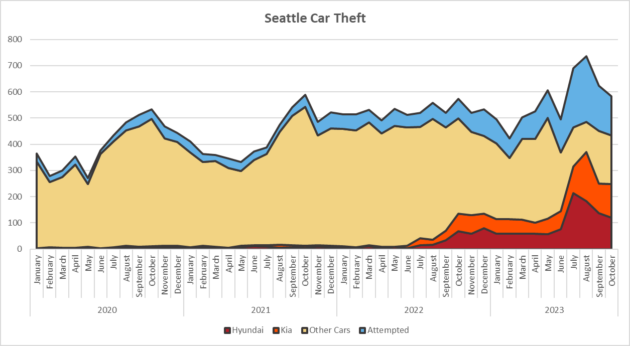
On Tuesday the Seattle City Council will vote on a resolution asking the National Highway Traffic Safety Administration to recall Kia and Hyundai models that lack engine immobilizing, anti-theft technology.
There was a 363% boost in reports of stolen Kias and a 503% boost in Hyundai thefts from 2021 to 2022, according to the Seattle Police Department. Through October of this year, Seattle reported 868 stolen Kias and 1,021 stolen Hyundais.
The surge in thefts has hit cities around the U.S., as documented in a recent story from Vice. If Seattle approves the resolution, which it appears likely to do, it will unite Baltimore and Philadelphia in making a recall ask.
Headlines from the Seattle area connect the stolen cars to crimes including “crash and grabs” in which criminals smash the cars into storefronts and rob the businesses. A Kia was used to crash into a window of the Nordstrom flagship store in downtown Seattle in July, though reports didn’t specify if it was a stolen vehicle. This fall, Kias and Hyundais were listed by police as potentially involved in a string of after-school robberies of Seattle high schools students, according to KUOW.
In January, Seattle became the first U.S. city to file a lawsuit against the automakers, alleging the companies failed to install standard anti-theft technology in many of their vehicles, leading to thefts and the harm of public safety. Sixteen other cities have now also pursued legal action. Seattle’s suit is still pending.

The suit filed in U.S. District Court in Seattle asserts that between 2011 and 2021, the two companies opted to forgo installation of an engine immobilizer that prevents cars from starting without their keys, while 96% of car manufacturers overall included the theft prevention device. The vehicles lacking the technology were lower-priced, entry-level models.
“This is really hitting people of limited means the most,” said Seattle City Councilmember Lisa Herbold in a Monday call with reporters addressing the recall.
In addition to the cars being stolen and sometimes involved in additional crimes, it can be hard to get the unprotected cars insured, Herbold added. “There are a lot of insurance companies that are rightfully identifying the ownership of these vehicles as too high risk,” she said.
“This is really hitting people of limited means the most.”
– Seattle City Council Councilmember Lisa Herbold
The spike in thefts began after teenagers posting videos on social media in late 2020 describing how to steal the cars simply by removing a plastic piece under the steering wheel and using a USB cord. The thefts ultimately became a viral TikTok trend.
Kia and Hyundai earlier this year released a software fix meant to address the vulnerability. A review of data from seven U.S. cities collected by the AP found the thefts were still on the rise three months after the software release.
Representatives of the companies said they’re working to reverse the trend.
“Our dealers across the country are maximizing the number of anti-theft software installations that can be performed on a daily basis, contributing to steadily increasing completion rates,” said Ira Gabriel, a senior manager in Hyundai Motor America’s corporate and marketing PR, via an emailed statement.
“Hyundai recently set-up multi-day service centers in Washington, D.C., St. Louis County, New York, Chicago, the Twin Cities and upstate New York with plans to replicate in additional markets to advocate scale and speed installation of the software upgrade,” he added.
Hyundai and Kia say their vehicles comply with federal theft protection regulations.
“The National Highway Traffic Safety Administration has publicly stated that it has not determined that this issue constitutes either a safety defect or non-compliance requiring a recall under the National Traffic and Motor Vehicle Safety Act,” James Bell, Kia America’s head of corporate communications and public relation, said via email. He cited a story from NBC News that referenced a letter from the administration addressed to attorneys general of multiple states.
Prior to the software update, the companies began offering free steering wheel locks for car owners through law enforcement agencies.
In its suit, the Seattle calls on Kia and Hyundai to take multiple steps to resolve the issue, including:
- taking action to stop the thefts;
- providing funding for auto theft prevention;
- and providing funding to cover damages caused by the absence of the engine immobilization devices.

